Five states, including Wisconsin, took part in the Leveraging Learner Voice to Strengthen CTE technical assistance cohort hosted by Advance CTE and ACTE. Inspired by CTE Without Limits: a Shared Vision for the Future of Career Technical Education, they’re using the With Learners, Not for Learners toolkit to involve learners in the design, delivery, and implementation of CTE programs and policies. This post focuses on Wisconsin’s “WisCORE” conference, where learners lead conversations and drive change in diversity, equity, and inclusion across the state’s technical colleges. For this post, Haley Wing, senior policy associate with Advance CTE, interviewed Colleen Larsen, education director for student success at Wisconsin Technical College System, a member of the Wisconsin state team for the Leveraging Learner Voice to Strengthen CTE technical assistance cohort and the coordinator for the state-wide WisCORE Conference planning and execution committee.
WisCORE: Where Learner Voices Spark Change in Race and Ethnicity Conversations
In October 2023, the Wisconsin Technical College System (WTCS) convened learners, staff, and faculty from across the System for the Wisconsin Technical College System Conference on Race and Ethnicity (WisCORE), a transformative conference dedicated to promoting diversity, equity, and inclusion (DEI) within the system’s colleges.
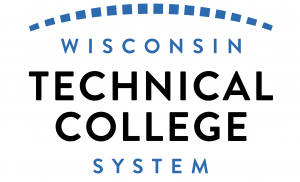 The WisCORE conference facilitates collaboration among WTCS colleges, enabling shared effective DEI strategies and building system-wide capacity for creating more inclusive campuses. By emphasizing the voices and experiences of learners, employees, and community members, the conference ensures that DEI efforts are informed by the perspectives of those most impacted, leading to more equitable and sustainable practices.
The WisCORE conference facilitates collaboration among WTCS colleges, enabling shared effective DEI strategies and building system-wide capacity for creating more inclusive campuses. By emphasizing the voices and experiences of learners, employees, and community members, the conference ensures that DEI efforts are informed by the perspectives of those most impacted, leading to more equitable and sustainable practices.
The WisCORE event and the Wisconsin state team’s work in the Leveraging Learner Voice to Strengthen CTE technical assistance cohort align seamlessly with the principles of CTE Without Limits, ensuring that every learner feels welcomed, supported, and empowered to succeed within the career preparation ecosystem. The conference and its outcomes elevate learners’ voices, prioritizing inclusion and equity, while establishing accountability and continuous improvement processes.
|
LEARNER TESTIMONIAL “WisCORE 2023 was my first experience, and it was a pleasant experience. Being able to attend and be involved meant a lot for me as a student. I got to hear other students share their personal stories and experiences within the college setting, as well as within their community. It was reassuring to hear students share similar thoughts and possible solutions on how colleges can improve on how they can create a welcoming space of diversity, equity, inclusion, self-advocacy, and cultural competency to better serve their student population. It’s nice to know that I was not the only student who wanted to advocate in those DEI areas and that the attendees, both staff and student, have a similar inspiration, which is to hear student voices for a sense of direction on how colleges can improve and better serve their students.” |
Building Bridges, Brick by Brick: The Collaborative Journey to WisCORE
The idea for the WisCORE conference was borne out of multiple leaders and learners in the Wisconsin Technical College system attending The National Conference on Race & Ethnicity in Higher Education (NCORE). Attendees of this conference reported rave reviews, and the requests for additional participants from each technical college quickly increased. During the NCORE 2018 conference in Portland, Colleen attended with others from her state and requested a Wisconsin-dedicated room for their state team. During their debriefing and unpacking the learning from the conference, she asked, “What would you like to do to bring this learning back to our state?”
From that conference room, the team, which included learners, staff and faculty, insisted that Wisconsin needed a dedicated convening to center belonging, connections and solutions to challenges learners frequently face. Leveraging a grant from Jobs For the Future centered on equity, the planning committee, which included learners, created the first WisCORE conference. Leveraging the demand from learners and support from faculty members, the collective advocacy across the state resulted in all 16 technical college presidents agreeing to submit $1,000 from each college budget to support the development and execution of the WisCORE conference. After the second conference, more faculty and learners took an interest in the event and requested that the conference occur annually, which the presidents agreed to support. This sustainable funding ensures the event is possible each year.
Grit and Grace: Lessons from WisCORE’s Road to Success
Planning and successfully executing an event like WisCORE comes with several benefits: learners are in the driver’s seat to lead meaningful change; faculty are made aware of learners’ experiences and opportunities to improve their supports in programs; and learner feedback and input are actualized in changes to policies, practices and more. Understanding these benefits is helpful when navigating the challenges and barriers that may come up when replicating a similar event. Colleen shared the following tips to support this work in Wisconsin and beyond:
- Support and develop a culture that values learners as partners: Colleen, other members of her team and learners across the technical college system have clearly articulated the need to center learners’ feedback and input on their educational experiences. Learners came up with the idea for WisCORE and System and college staff coordinated resources to support their vision. Learners facilitate the conference, lead break-out sessions, facilitate caucuses and serve as keynote speakers. Learners have been at the table at every stage of development for the WisCORE conference. The System created a video at the event highlighting the importance of learner voice.
- This environment fosters greater learner engagement and learners are empowered to consult and offer feedback to leaders within the education system. Aligning everyone within your state agency, institution, or organization on the definition, meaning, and value of authentic learner engagement is a great way to ensure everyone is working towards the same goal and feels empowered to take action. Additional resources and recommendations are also in the With Learners, Not for Learners toolkit for beginning meaningful learner engagement work.
- Structure opportunities that foster equitable learner engagement: The WisCORE conference is designed with each college in the System invited to attend with a team. The team is required to be at least 50% learner-led. Learners are crucial to the makeup of college teams to ensure they are seen as leaders and have space to facilitate conversations and solutions that impact learners’ experiences most. To create enough space for all learners attending to share their experiences during the conference, each team is limited to 10 members (160 total conference attendees). While the interest is high, the WisCORE Planning Committee considers the space constraints; each year, the WisCORE conference is hosted at a different technical college campus. Given the space available at the colleges, 160 participants for the conference is the max.
- Another equity component of the WisCORE conference and similar learner engagements is the availability and accessibility of attending an in-person conference. If a learner cannot attend the conference in person, the team has previously leveraged hybrid options. This sufficed for the time, however, Colleen mentioned the difficulty of ensuring learners feel included and part of the team when joining sessions virtually. For the 2023 WisCORE conference, the team leveraged Encore Sessions: virtual sessions held after the conference that allows others to engage across the System. In these Encore Sessions, learners present and facilitate topics included in the in-person conference. This adaptability allows for equitable engagement if a learner cannot attend the conference in person.
- Focus your efforts to ensure you’re meeting learners’ needs: Events like WisCORE, and similar learner engagement opportunities, emerge from the ground up to inform the collective of opportunities for improvement. When engaging in grassroots work, the swath of information and perspectives can make it challenging to focus efforts. When encountering this challenge with the WisCORE Planning Committee, Colleen elevates choosing a specific engagement theme. For example, for the WisCORE conference, each year, the Planning Committee determines a theme with the inclusion of learner feedback and input. Simply asking learners what they care about and what they would like to discuss when it comes to their CTE experiences is a great way to begin developing a theme and ensuring learners’ needs are met. During the planning process for WisCORE, Colleen mentioned mental health came up as an important theme, as did the representation of indigenous learners and learners with disabilities. This input from learners informed the design of the conference sessions and speakers.
- When learners design programs and strategies alongside us, we create initiatives that genuinely resonate with their needs and break down barriers to their success. Leaders interested in meaningfully engaging learners can begin with a group of learners and ask them what they want to see, implement, develop, and more. If a group of learners is not easily accessible, meeting learners where they are and simply listening to their ideas and input can be a great place to start. While listening to learners, determine where to leverage your resources, capital and more to actualize learners’ ideas for increasing inclusion and closing gaps in access and success metrics.
|
LEARNER TESTIMONIAL “I learned the value of advocating for yourself and for others and that there are many out there who are likely facing the issue like us. And how important it is for each individual to be responsible and respectful.” |
Beyond Conversation, Beyond Collaboration: WisCORE’s Tangible Impact
As a result of the WisCORE conference, learners and faculty members across the state report the impact of the conference:
- Learners across the state are more deeply and meaningfully engaged: The Wisconsin team has seen an increase in learners’ engagement on college campuses. This includes learners serving on committees and interacting with leaders within their college. Due to the high-impact nature of the WisCORE conference, direct action items are addressed and implemented, such as creating dedicated seats for learners on each of the technical college’s president executive committees or boards. Learners on these committees meet with their college’s president’s committee or board to discuss important issues affecting learners and provide input on solutions. Colleges in the state have also designated learner spaces on DEI committees.
- Learners are actively shaping conversations about their educational experiences: During the inaugural WisCORE conference, the staff helping to plan the event held an assumption that learners would not be able to ‘handle’ seeing data across the state technical college system. Learners on the planning committee advocated, that in the first year, the conference engaged learners at the conference in a data dive for their college campus. This activity allowed learners to share their feedback and input on root-cause analysis. After this model, some colleges returned this practice to campus and included learners in data reviews. The Wisconsin state team has also seen learners included in regional Perkins needs assessments. Learners are great partners for discussing the root-cause analysis of various data points.
- Learners drive diversity, equity, and inclusion on college campuses: The WisCORE conference empowers learners to be agents of change in their colleges’ DEI efforts. Through student panels, breakouts and keynote speeches, learners dive deep into DEI and brainstorm solutions. The highlight is “team time” where learners collaborate with their colleagues to create concrete action plans with at least three actionable steps to advance DEI on campus. This event challenges the traditional top-down approach, prioritizing learner voices and fostering meaningful collaborations for lasting impact.
Looking Ahead: Amplifying Learner Voices Beyond the Conference Walls
As the Wisconsin team looks forward, they continue to leverage learner voice to strengthen CTE. In addition to their work with the WisCORE conference, the team continues to share and elevate promising practices and approaches related to their learner engagement work in the Leveraging Learner Voice to Strengthen CTE technical assistance cohort. With all learner engagement work across secondary and postsecondary systems, the team continues to center learners and their experiences, support learners as they engage to improve their educational experiences and create sustainable structures to help shift mindsets and practices as it relates to learner engagement work.
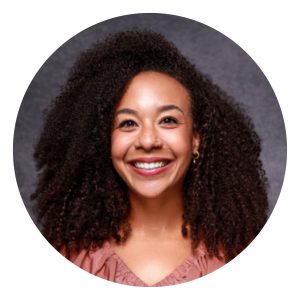 For additional information about leveraging learner voice, please visit the following pages on the Advance CTE website:
For additional information about leveraging learner voice, please visit the following pages on the Advance CTE website:
- Learner Voice Toolkit
- Family Engagement in Career Pathways
- Blog highlighting the Learner Voice Cohort
- Technical Assistance Interest and Request Form
Haley Wing, Senior Policy Associate, Advance CTE


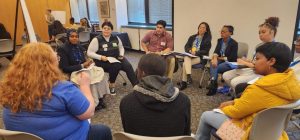
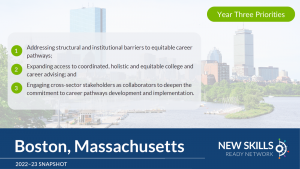
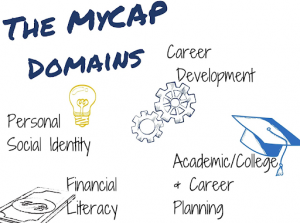 In expanding access to college and career advising, Boston Public School members of the initiative’s
In expanding access to college and career advising, Boston Public School members of the initiative’s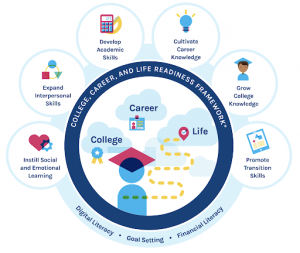 Implementing MyCAP with fidelity across Boston Public Schools requires sustainable and deepened staff capacity at the district’s central office as well as at the school level. Marsha and Erin both support cultivating and maintaining strategic partnerships across the district to align with MyCAP priorities. The collaboration and partnerships during this first year of expanded access to middle-grade learners included leveraging family liaisons who support informing learners and families of opportunities within Boston Public Schools and activating counselor teams that support caseloads of learners in the middle grades. The project team also expanded its reach to include community partnerships that operate in the college and career areas to better serve middle-grade learners. The advantage of bringing these partnerships into the fold allowed greater support for learners with exposure to skills and experiences that support college and career readiness and success (see image).
Implementing MyCAP with fidelity across Boston Public Schools requires sustainable and deepened staff capacity at the district’s central office as well as at the school level. Marsha and Erin both support cultivating and maintaining strategic partnerships across the district to align with MyCAP priorities. The collaboration and partnerships during this first year of expanded access to middle-grade learners included leveraging family liaisons who support informing learners and families of opportunities within Boston Public Schools and activating counselor teams that support caseloads of learners in the middle grades. The project team also expanded its reach to include community partnerships that operate in the college and career areas to better serve middle-grade learners. The advantage of bringing these partnerships into the fold allowed greater support for learners with exposure to skills and experiences that support college and career readiness and success (see image). 
